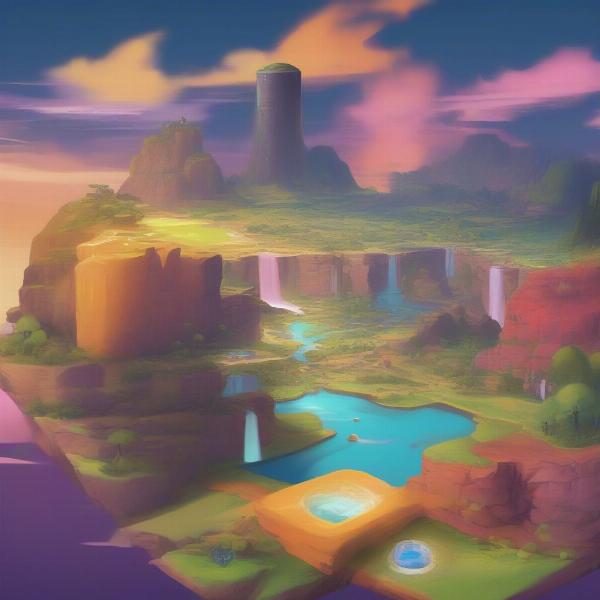The question of whether a DLC, or downloadable content, can clinch the prestigious Game of the Year (GOTY) award is a hot topic within the gaming community. This debate touches on core aspects of game evaluation, and raises questions about what truly defines a game versus an expansion. Here at SupremeDuelist.blog, we’re diving deep to explore the arguments and possibilities surrounding this fascinating subject. It’s not just about more content; it’s about the impact that content has on the overall gaming experience.
The prevailing perception is that Game of the Year awards are typically reserved for full, standalone games. But what happens when a DLC fundamentally alters and enhances the base game to such an extent that it feels like a new experience altogether? We’ll look at the criteria used by major award bodies, examine examples of impactful DLCs, and ultimately consider if the gaming landscape might be shifting toward recognizing significant expansions as worthy contenders. To get a further understanding of the topic, you can explore the question of [can a dlc win game of the year].
Understanding Game of the Year Criteria
Game of the Year awards are bestowed by various organizations and publications, each with its own set of criteria. However, there are common themes that generally influence voting. These include:
- Innovation: Does the game push boundaries, introduce new mechanics, or redefine genre conventions?
- Storytelling: Does the game have a compelling narrative, well-developed characters, and an engaging plot?
- Gameplay: Is the game fun, challenging, and satisfying to play? Are the controls responsive and intuitive?
- Technical Achievement: Does the game demonstrate impressive graphics, sound design, and overall performance?
- Impact: Does the game leave a lasting impression and influence the industry?
- Overall Polish: Is the game polished, bug-free, and a high-quality experience?
A DLC can significantly contribute to any or all of these aspects. For instance, a story-driven expansion might introduce a more engaging narrative than the original game, or a gameplay-focused DLC could add new mechanics that revitalize the core experience. The critical question is if the DLC can meet these criteria with the same impact as a standalone title.
The Challenge for DLCs: Perceived Limitations
There are inherent challenges that DLCs face when considered for Game of the Year awards. Here are some of them:
- Dependency on the Base Game: DLCs are almost always an extension of an existing game, and often they require owning that game to play. This inherent dependency is often seen as a negative, because the DLC might not exist without the original, thus it’s less of a stand-alone game.
- Scope and Scale: Many DLCs are designed to be shorter and smaller in scope compared to full games, they have a limited effect on the whole structure. This can hinder their ability to create the same sense of a complete and transformative gaming experience.
- Pricing: While not always the case, DLCs are often perceived as being overpriced for the amount of content they provide, potentially hindering the perception of value.
- Marketing: Marketing is often focused on the base game, meaning DLCs don’t receive the same level of attention and exposure. This can lead to lower sales and a smaller impact.
 Game of the Year Award Trophy
Game of the Year Award Trophy
These hurdles make it difficult for a DLC to be considered as a game of the year, which makes it difficult to achieve this goal and reach the highest step. However, some DLCs have managed to overcome these limitations and make a significant impact.
When DLCs Transform the Game
Certain DLCs have drastically improved their base games, and some can be considered essential parts of the whole experience. Here are some cases where DLCs have transformed their base games:
- Story Expansions: Some DLCs like The Witcher 3: Blood and Wine have delivered compelling narratives, which provide a fresh storyline, unique characters, and expansive new world areas, effectively feeling like a standalone game.
- Gameplay Overhauls: Some DLCs can completely change how the base game is played. An example of this is Monster Hunter World: Iceborne, which introduced new monsters, locations, and mechanics. This expansion significantly altered the metagame and extended the lifespan of the original title.
- World Expansions: DLCs that expand the world and lore of the original game offer players a much richer experience. They build on the existing foundations, creating even more compelling and immersive worlds, pushing the limits of the game.
These expansions show that DLCs are not just additional content. They can be innovative, engaging, and transformative, which makes us think differently about what constitutes a game. If you’re interested in exploring the potential for future expansions, you might want to read about [can shadow of the erdtree win game of the year].
Expert Opinions on DLCs and GOTY
To gain a deeper perspective on this debate, we consulted a hypothetical gaming expert, Dr. Evelyn Reed, a respected game design professor and critic.
“The traditional view is that GOTY awards are for complete, standalone games. However, a high-quality DLC that fundamentally changes or enhances the base game to a great degree can undoubtedly compete. It’s about the overall impact and value the experience provides. The fact that it’s a DLC shouldn’t automatically disqualify it.”
“We need to assess DLCs on their own merits. Does it bring a fresh perspective? Does it innovate? Does it engage? If it ticks these boxes, then it should be considered, whether it’s a standalone game or not. As the gaming industry evolves, so do our evaluation criteria.”
These quotes highlight that the discussion of whether DLCs can win GOTY awards is really a matter of shifting perspective, and the evolution of judging criteria as the industry changes.
How DLCs Could Actually Win Game of the Year
While it might seem like an uphill battle, there are scenarios where a DLC could realistically clinch the Game of the Year award:
- Exceptional Quality: The DLC would need to be of exceptional quality, surpassing not only the base game but also all other games released in the year. It needs to be a truly memorable experience.
- Transformative Impact: The DLC would have to fundamentally change the gameplay, storyline, or world in a way that enhances the base game to a level of a completely new experience.
- Widespread Acclaim: It would need to be universally acclaimed by both critics and players, generating strong positive buzz and achieving strong sales.
- Innovative Approach: The DLC would need to bring something unique to the table. Something new in gaming as a whole, going beyond the conventions and expectations of the genre.
For example, if a DLC provides a substantial amount of new content with new mechanics, innovative storytelling, and high polish, it would have a better chance at being recognized as an outstanding product, regardless of its status as an expansion.
 DLC Transforming Game Experience
DLC Transforming Game Experience
The key would be to completely redefine what people expect from downloadable content, and to show that it has the same potential as any new title. For gamers looking at ways to enhance their experiences with expansions, understanding if and how [can i use steam points to buy games] might be relevant to purchase DLCs.
The Future of DLCs and GOTY
The debate about DLCs and Game of the Year awards is indicative of the gaming industry’s evolving nature. As DLCs become more ambitious and sophisticated, the lines between full games and expansions become more blurred. We may see future awards consider these expansions on a more level playing field with standalone games.
The quality of content is what truly matters. The traditional line of thought needs to evolve, to fully appreciate a great piece of gaming, whether it’s a full game or an expansion. If a DLC provides a better gaming experience than a full game, then it should be considered worthy of recognition.
Conclusion
The question of whether DLCs can win Game of the Year awards is a complex one, but it’s one that’s increasingly relevant in the modern gaming landscape. While traditionally these awards are reserved for full, standalone games, the potential for transformative DLCs to fundamentally alter and elevate their base games can’t be ignored. The criteria for evaluating games must evolve to recognize the impact and value of truly exceptional expansions. Here at SupremeDuelist.blog we’ll continue to keep a close eye on the gaming scene, and see whether a DLC can truly reach the highest of heights. As the industry moves forward, it’s likely that we’ll see a shift towards a more inclusive view of what constitutes a great gaming experience. Now, it’s time to jump back into your favorite games, and discover these new experiences firsthand.
Leave a Reply